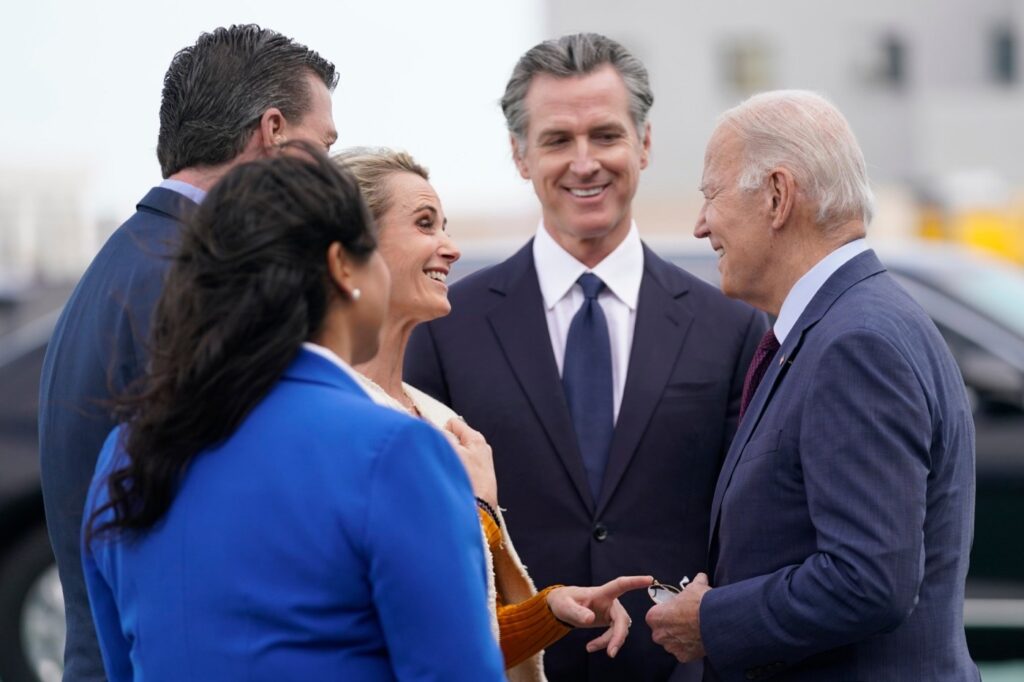
In some ways, California Gov. Gavin Newsom was born to be president; he’s good-looking, sharp-tongued, and full of ambition. But his political and personal profile also make him a major liability for the Democrats.
Over the past year, Newsom has been increasingly considered as a potential future leader of the Democratic Party and a political successor to President Biden. He’s already a clear favorite for the 2028 presidential primary, and some have even suggested that we could find him — instead of Biden — on the ballot this November.
But despite being young, energetic, and politically savvy, he’s also deeply unpopular in his home state. Both his policy record and his public image are representative of the establishment wing of the Democratic Party that is failing to rally its own base.
While on the campaign trail stumping for President Biden, Newsom has repeatedly claimed that California’s economy is “booming,” thanks in large part to his fiscal policies. Not only is it rich for the governor, who forcibly shut down the state economy during the pandemic, to take credit for California’s partial rebound — it’s also misleading, as the state still faces a fiscal cliff despite his recently unveiled budget plan.
It’s tough to make the case that California is indeed “booming” when the state’s homeless crisis continues to worsen despite massive government investment. The same can be said of the state’s evaporating affordable housing market, shrinking middle class, and flailing public education system; these have become critical issues as the wealthiest Californians increasingly benefit from Newsom’s crippling regulatory schemes, reckless spending habits, and myopic social policies.
Under Newsom, California has experienced record homelessness, emigration, and budget deficits, raising questions about Newsom’s ability to handle complex, systemic issues — a critical requirement for any presidential hopeful.
In addition to policy failures, Newsom’s personal conduct has also invited scrutiny. First, there was his extramarital affair while serving as Mayor of San Francisco. Then there was the infamous French Laundry incident, where he was photographed dining in an extravagant restaurant without a mask during the peak of the pandemic. More recently, he demonstrated shameless apathy toward the homeless of San Francisco, and then came “PaneraGate,” in which he was accused of pay-for-play favoritism toward a billionaire donor to his gubernatorial campaigns.
Given all this controversy, it should come as no surprise that Newsom’s approval rating has dropped below 50 percent for the first time since 2019.
Despite the polls, however, the governor apparently still has significant support. In 2021, Newsom defeated a recall attempt by a healthy margin; the following year, he was reelected to a second term with a similarly strong showing. And Proposition 1, the state’s latest effort to further centralize control over the homeless while continuing to burn taxpayer dollars, looks certain to pass — if only by a narrow margin.
To assume this recent track record of success is a promising indication for a presidential run would be naïve. Even if Newsom’s policies and leadership style resonate with a significant portion of the California electorate, a growing bipartisan cohort of Americans resent the state as well as many of the policies that Newsom has championed as governor.
Related Articles
Trump’s ‘bloodbath’ comment wrongly taken out of context
Gov. Newsom playing tricks with Proposition 1 vote count
Mike Levin: Bipartisan compromise is key to solving border and immigration challenges
Long Beach Unified School District pays kids $1,400 to become leftist agitators
High-Speed Rail Authority: A real lemon in California
The Democratic Party must contend with growing voter fatigue and frustration with run-of-the-mill establishment politicians. Moreover, it faces the challenge of uniting a diverse coalition of voters, including progressives, independents, and other nontraditional groups. Newsom’s radioactive policy record and perceived elitism, not to mention his connections to wealthy donors and equally divisive California policymakers such as Nancy Pelosi and Kamala Harris, could alienate the swing voters necessary for a presidential victory.
To win elections, the Democrats need to rally around a unifying figure, and as a native Californian I can confidently say that figure would not and should not be Newsom.
Gabe Benitez is a fundraising professional at the University of Chicago, a volunteer with the Chicago Covenants Project and Crossing Party Lines, and a contributor for Young Voices. His writing has been featured in the Chicago Tribune and The Hill.
